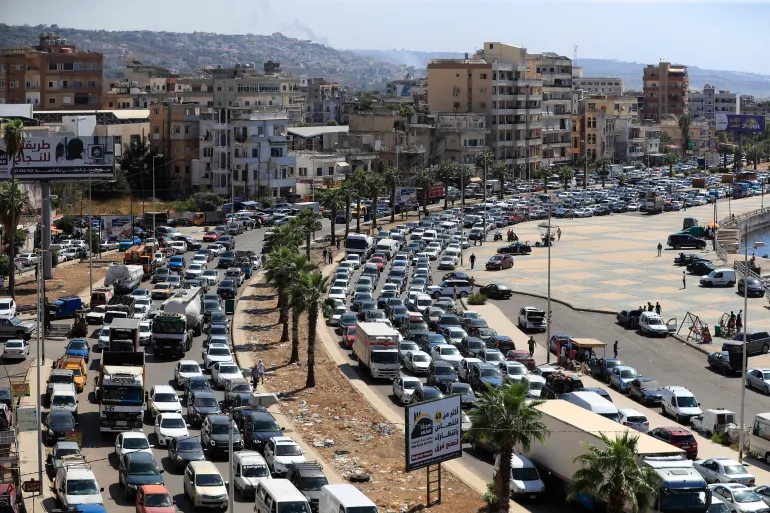
The cruel images also showed tens of thousands of people fleeing their cities and towns in the south towards the capital, in what can be defined as a “black Monday” for the Lebanese people, faced with the bombs of the terrorist state of Israel.
Tens of thousands of Lebanese across the country have been contacted by phone by Israel and ordered to leave their homes as the Israeli military intensifies its attacks on Lebanon and Hezbollah.
Israel Defense Forces Chief of Staff Lt. Gen. Herzi Halevi said that “essentially, we are attacking the combat infrastructure that Hezbollah has been building for the past 20 years.” But the infrastructure that Israel claims to have destroyed actually includes homes, businesses, various establishments and the deaths of Lebanese.
Israeli Prime Minister Benjamin Netanyahu said “difficult” days lie ahead.
A Lebanese security source said: “If the Israeli army carries out a ground invasion, the Lebanese army will participate with Hezbollah in the confrontation and defense.”
As Israel struck locations across the south, including on the outskirts of major cities such as Tyre, residents of Beirut and southern Lebanon said they were called on their landlines and ordered to evacuate 1 km from suspected Hezbollah sites.
Some residents also received calls and text messages in Beirut from a Lebanese number ordering them to evacuate immediately.
Lebanon’s Information Minister Ziad Makary told Reuters his ministry had received the same Israeli order, via a recorded voice message, but would not evacuate. “This is psychological warfare,” he said.
On Monday morning, Avichay Adraee, Israel’s spokesman for Arabic-speaking media, posted a video on X claiming that the Lebanese know there are Hezbollah weapons in their homes.
The complaint was made without evidence and was accompanied by further warnings to flee.
In the afternoon, the roads leading out of the south were packed with families trying to make their way north in search of apparent safety.
Local media reported chaotic scenes in the town of Saida, where roads were blocked as residents rushed to leave.
Lebanon’s Interior Ministry said it had opened schools in Beirut, Tripoli and parts of the east and south of the country as shelters amid “heavy displacement.”
Wave of Israeli attacks
As Israel stepped up its attacks on Monday morning and then later in the afternoon, Yoav Gallant, Israel’s defense minister, said that “we are deepening our attacks in Lebanon” and told the Israeli public that “they will have to show composure.”
It remains unclear whether Israel intends to invade the country by land. Israeli troops have not invaded Lebanon since the country fought a disastrous month-long war against Hezbollah in 2006, which was widely seen as a strategic defeat for Israel.
Since then, Hezbollah has grown in strength, size and experience.
Asked about a possible ground invasion, Israeli military spokesman Daniel Hagari said: “We will do whatever is necessary.”
Meanwhile, Hezbollah said on Monday it had fired dozens of rockets at several Israeli military posts.
The Israeli military said 35 projectiles were launched from Lebanon towards northern Israel, some of which were intercepted.
Israeli firefighters were called to several areas in the north to put out the flames. Five people were slightly injured by a rocket that fell near the Golani crossing in the Galilee region, according to Israeli emergency services.
The attacks came at a time when Israel was carrying out some of its heaviest attacks since the war broke out last October.
On Friday, an Israeli airstrike on a densely populated southern suburb of Beirut killed 45 people, including several children and women.
Hezbollah said 16 of its members were killed in the attack, including leader Ibrahim Aqil and supreme commander Ahmed Wahbi.
This came days after two days of Israeli strikes that detonated booby-trapped pagers and radios belonging to Hezbollah.
At least 39 people were killed in the attacks and more than 3,000 were injured.
The imperialist powers are responsible
Since October 7, the region has never been so close to burning. The imperialist powers are entirely responsible for this situation. For eleven months, they have given Israel complete freedom of action. By delivering tons and tons of weapons and ammunition, used to massacre the Palestinian people in Gaza, the imperialist powers, led by the United States, have ruthlessly repressed the mobilizations of solidarity with Palestine that have blossomed throughout the world. Supported militarily, morally and economically by the imperialist countries, Israel has been able to continue its massacre in Gaza with impunity, force two million inhabitants of Gaza to leave their homes, reduce the enclave to dust, annex more towns in the West Bank and bomb (at different levels) almost all the neighboring countries: Syria, Iraq, Yemen, Lebanon and Iran.
While the Zionist far right has put on its agenda the project of a “greater Israel”, a Jewish state that would stretch from the Nile to the Euphrates, and the government aspires to resolve its Palestinian problem once and for all, the State of Israel threatens more than ever to wage a devastating war in Lebanon, whose population will have to pay the price in fire and blood.
Neither the calls for calm made in recent days by the American Democratic administration, which fears, on the eve of the elections, to involve the country in a new conflict, nor the change of tone of Emmanuel Macron in defence of France’s material interests in Lebanon can hide this responsibility. Faced with the mortal danger that the State of Israel represents for Lebanon, only the struggle of the workers and the popular classes of all the countries of the region can prevent the bloodbath that is coming.
As for the Israeli people, they have embarked on a dead-end path from which there will be no return if they do not decisively break with the colonial ambitions of the State of Israel and put an end to the genocide in Palestine. A perspective that is all the more central since, at a time when opposition to Netanyahu is growing in the country, the massive mobilisations against him do not offer any progressive solution to the current situation, since they do not demand an end to the genocide of the Palestinians or to the brutal bombing of Lebanon.
In this context, and even though Israel, if it were to wage war in Lebanon, would be even more dependent on supplies from its imperialist allies, mobilizations of solidarity with Palestine throughout the world are of crucial importance.
With information from Middle East Eye and Revolution Permanente.
Source: www.laizquierdadiario.com

